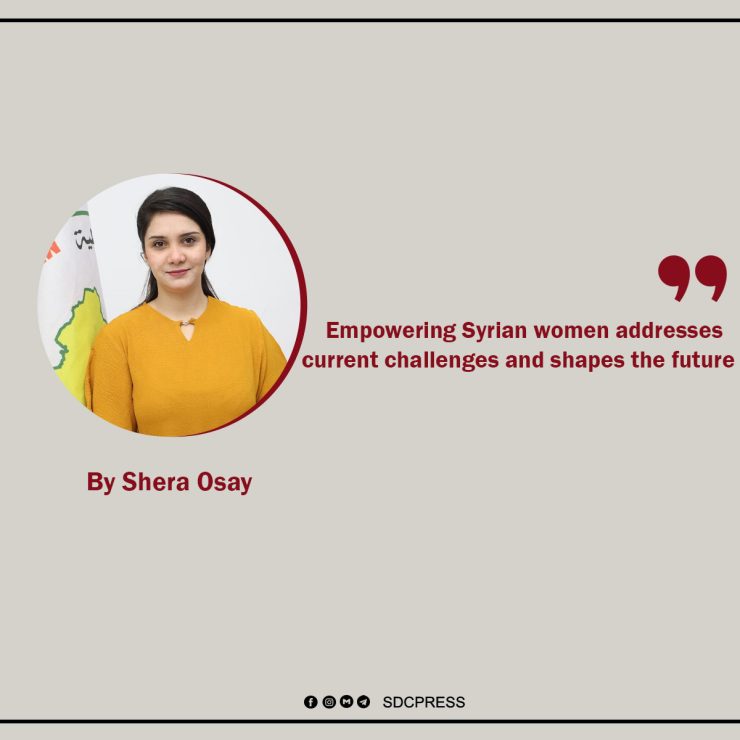By Shera Osay
Co-chairwoman of the SDC’s Media Office
Empowering women is considered one of the vital issues that has captured public opinion for decades. Its significance has increased in light of recent political and societal developments. Also, it is a key indicator of a society’s progress at cognitive, political, cultural, and legal levels. Women play a crucial role as fundamental pillars of society.
Extensive efforts were made to enhance women’s capabilities in various fields. The aim was to boost their self-confidence on career options. This, in turn, empowers women and enables them to assume decision-making positions and play influential leadership roles in political empowerment.
Political empowerment for women ensures their equal participation in all societal and political fields, including political parties and civil society organizations. It involves granting them the necessary authority to fulfill their responsibilities effectively. Women’s empowerment is a positive outcome of programs aimed at building their capacities and creating available opportunities in society to ensure their effective participation at all levels.
Syrian women face many challenges despite the significant efforts made by them.
However, they have achieved significant educational and cultural accomplishments, but their opportunities for participation in aspects of life have been limited for decades.
Also: Women embody the struggle for freedom and peacemaking
It is notable that Syrian women have been unable to establish women’s organizations capable of overcoming the obstacles they face. This has been reflected in their political participation, which has remained limited within influential structures and decision-making bodies.
Several factors contribute to this situation. Foremost among these is achieving empowerment in political, economic, social, and legal fields. It is difficult to make progress in the political sphere without achieving similar advancements in these other areas. Additionally, women continue to face significant challenges rooted in societal customs, traditions, and norms. These obstacles can hinder their empowerment, even when they realize the importance of their role. It is also essential to acknowledge that prevailing laws, societal attitudes and the perspectives of political parties on women’s roles, often obstruct the process of empowerment.
An analysis of women’s status in Syria and globally reveals that theoretical frameworks, whether rooted in historical and religious foundations or inspired by modern Western ideologies, have failed to accurately address social and cultural situations regarding women. This has hindered the development of a clear strategy to advance women’s status in society.
The problem lies in a flawed approach that has persisted. Even feminist movements and organizations failed to overcome existing obstacles. In response, the targeted approach is required to create a system that addresses needs of women and combats patriarchal biases at all levels.
To achieve this goal, women must be empowered to forge their own identities and achieve their aspirations. Syrian women have demonstrated their capacity for this through their active participation in the popular movement for change over the past decade. Therefore, the main obstacle does not lie in women’s ability to change but in societal attitudes of how to integrate them into political matters.
Given the aforementioned challenges faced by women, traditional Western models have not been effective. These models have failed to overcome deeply rooted patriarchal systems.
These liberal systems have marginalized women’s crucial roles within societal frameworks, particularly in the political sphere.
Women’s reality in the political arena is still a concern. They continue to be influenced by a male-political dominance. This male dominance shapes roles within state structures.
Women frequently are restricted to express their opinions within predefined paths dictated by the masculine mindset. This situation has led to the emergence of what could be termed “masculine women” in many countries around the world. As a result, women’s active participation stemming from their own will and intellectual abilities is absent from the political process.
Consequently, it is obvious that sustainable development cannot be achieved in societies by marginalizing women or limiting their participation in power positions. Rather, it requires systematic and organized processes aimed at placing women in decision-making positions. They should occupy roles in governance and administration, whether in institutions or ministerial and presidential positions.
The experience of the revolutionary women’s system in northeastern Syria emerged as a positive and exemplary model. It was an effective solution to achieve genuine women’s empowerment and to overcome the limitations of traditional models. During a short period, this system has achieved extraordinary accomplishments by women.
This experience has been distinguished by its pioneering role in achieving military victories and making fundamental changes in societal laws related to women. It also has been capable of changing the stereotypical perspective about women. That perspective has negatively impacted the women’s crucial roles in society for a long time.
One of the distinctive features of this experience is the genuine representation of women in bodies and institutions. Women in these regions have become actively engaged in political activities. Additionally, they actively have participated in the decision-making process related to society in various fields.
It is worth mentioning that there is a comprehensive system dedicated to women. It is advanced in military, political, and ideological fields. This system has created suitable opportunities to activate women’s roles in the political process in an effective manner.
This experience offers a practical model for overcoming the challenges previously mentioned. It also demonstrates the possibility of making a crucial change regarding women’s situation when the appropriate conditions and genuine will for change are present. It thus helps to empower women in different areas. Additionally, it seeks to develop women’s empowerment strategies, overcoming the shortcomings of traditional Western models and approaches.
Also: Escalating humanitarian crisis in Syria is a call for solidarity among various parties
In the context of the ongoing Syrian crisis, women have been among the most significant affected ones. Therefore, women’s empowerment emerges as a fundamental condition for achieving a comprehensive political solution. To achieve this, it is necessary to engage in national dialogues with various, Syrian and societal groups. Also, it is essential to establish vital paths that compel all parties to involve women in different political sectors.
A crucial step is the establishment of Syrian women’s political gatherings, based on organizing and empowering women theoretically and practically. These gatherings will serve as a platform to provide support and assistance to women practically. Thus, they will contribute to the consolidation of women’s active role in building Syria’s future.
There has been a need for regular workshops and dialogue sessions for empowering women.
The aim was to achieve a genuine equality in society and the effective empowerment of women politically, economically, and culturally. Therefore, the Syrian Democratic Council (SDC) has recently set up academic and organizational programs and held dialogue sessions. The purpose was to enrich women’s awareness and urge them towards organized academic work. Consequently, it will culminate in positive outcomes that contribute effectively to women’s empowerment.
We have a national and historical obligation to rapidly empower women and grant them full rights. We must strive to place women in the position that befits their value, capabilities, and potentials, in recognition of their sacrifices throughout history. It is important to realize that stability and progress can only be achieved through ensuring the active participation of women in all areas of national work.
This comprehensive vision for women’s empowerment is a moral imperative. Also, it is a prerequisite for achieving sustainable and inclusive development.
Empowering women fully will create a better and brighter future for everyone. It is not just about women; it benefits everyone and strengthens society. So, women’s empowerment is essential for building better, more united communities.
This comprehensive approach regarding women’s empowerment overcomes traditional models that have proven to be limited. It confirms the successful experiences by women in northeastern Syria. Additionally, it emphasizes the need for radical change in societal attitudes and structures. Moreover, it focuses on building women’s capacities and providing them with genuine opportunities to participate in decision-making at all levels.




